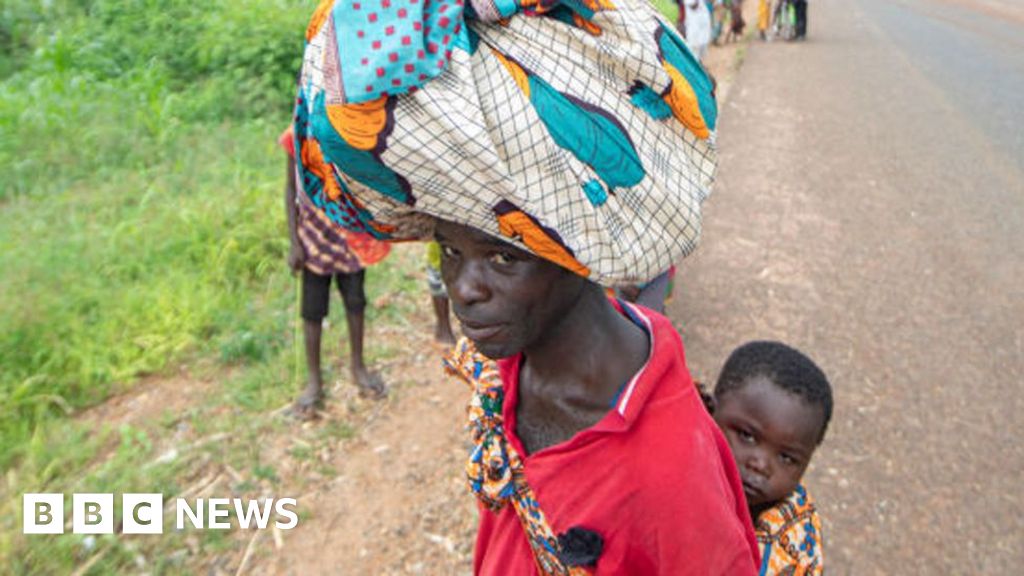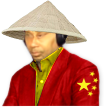Mister Terrific
It’s in the name
An Islamist group used child soldiers in Mozambique attacks - HRW
Al-Shabab, which is affiliated to the Islamic State group, has previously been accused by UN agencies of kidnapping children and using them as soldiers in its insurgency in the region, which began in 2017. A surge of attacks by insurgents in March left at least 70 children missing, according to local authorities and a group of aid agencies.
Witnesses told the rights group that dozens of child soldiers were used in the attacks and were seen carrying AK-style assault rifles and ammunition belts. Two people from the same family said they recognized their 13-year-old nephew among the children.
"I saw him with my own eyes," Abu Rachide, a resident of the town, told Human Rights Watch. He said the boy waved at him but marched on. Rachide's sister said the boy, who went missing earlier in the year, appeared to be taking instructions from older fighters.
"I kept wondering how he became a fighter like that in just four months," she told HRW.
The latest attacks on the town of Macomia began Friday and continued until the next day. Islamist fighters looted shops and warehouses for food and exchanged fire with Mozambican and South African soldiers before retreating, HRW and Mozambican media reports said.
At least 10 people, mostly soldiers, were reportedly killed in the latest fighting and about 700 residents fled to nearby forests to escape the attacks, according to the HRW report.
Recruiting children under the age of 15 as soldiers is a war crime under international law. In February judges at the International Criminal Court granted reparations of more than 52 million euros ($56 million) to thousands of victims of a convicted commander of a Ugandan rebel group, which included former child soldiers.
The attacks in Mozambique came days before the nonprofit Environmental Investigation Agency, which investigates environmental crimes, published a multi-year investigation alleging that millions of tons of timber had been exported illegally from Cabo Delgado to China since 2017 and the profits had been used to finance the insurgency.
The EIA said Tuesday that its investigation found that Chinese traders purchase "conflict timber" from insurgents in Cabo Delgado "and export it alongside other wood" in violation of Mozambique's log export ban.
The illicit trade with China fuelling Mozambique's insurgency
Timber smuggling, estimated to be worth $23m (£18m) a year, from Mozambique’s ancient forests to China is helping to fund a brutal Islamist insurgency as well as a large criminal network in the north of the southern African country.
This illicit trade in rosewood is linked to the financing of Mozambique’s Islamic-State linked militants, in the northernmost province of Cabo Delgado, according to data seen by the BBC from the Environmental Investigation Agency (EIA), an NGO that campaigns against alleged environmental crime.
Rosewood is a catch-all trade term for a wide range of tropical hardwoods that are highly prized for luxury furniture in China.
Mozambique’s rosewood is protected under an international treaty, meaning only very limited trade that does not threaten the species is allowed.
While the Chinese authorities have made it illegal to log rosewood in their own country, huge quantities continue to be imported.
Rosewood is given a customs code for hongmu (meaning red wood in Chinese) on arrival in the country, which allows researchers to trace it.
Mozambique was China's top African supplier of hongmu last year, providing over 20,000 tonnes worth $11.7m, according to Trade Data Monitor, a commercial company that tracks global trade.
It has overtaken other countries like Senegal, Nigeria and Madagascar as their rosewood species have been stripped or depleted, or laws banning exports have been more strictly enforced.
As part of its undercover investigation, the EIA tracked a huge rosewood shipment out of Mozambique.
Between October 2023 and March 2024, investigators traced around 300 containers of a type of rosewood known as pau preto from the port of Beira to China.
Pau preto rosewood, which is found in the north of Mozambique and in Tanzania, is classed as a threatened species on the International Union for Conservation of Nature (IUCN) red list.
These 300 containers were transporting 10,000 tonnes of the rosewood. Trader estimates value each container at around $60,000, putting the value of the total shipment at around $18m.
Deforestation in Mozambique is continuing apace. The country is losing the equivalent of around 1,000 football pitches of forest cover every day, according to NGO Global Forest Watch.
The trade in rosewood is supposed to be restricted under Cites, a global agreement to regulate the trade in endangered species, yet it has become the most-trafficked wildlife product in the world, according to the United Nations Office on Drugs and Crime. In terms of value, it now far outpaces trade in elephant ivory and rhino horn.
Pau preto rosewood is listed on Cites Appendix II, meaning that for it to be exported legally the Mozambique government must complete a thorough scientific investigation called a non-detriment funding study (NDF) to ensure trade does not threaten its survival.
The BBC asked the Mozambican representative to Cites Cornelio Miguel, who works for the National Administration of Conservation Areas, if an NDF on pau preto had ever been carried out. He did not provide a comment.
Without this assessment, any trade violates the international treaty. China, as a signatory, would be breaking the treaty’s terms in accepting non-compliant imports.
The BBC contacted some of the Chinese trading firms cited in the EIA report, but none were willing to comment on whether they were being supplied with timber from Mozambique.
For environmentalists like Dr Annah Lake Zhu from Wageningen University, this treaty can only ever be as robust as the governments enforcing it. She believes sustainable management of the rosewood trade needs a total rethink.
Dr Zhu says the treaty does not halt the insatiable demand from China’s elite for hongmu furniture.
Insurgent activity in the province has led to one of Africa’s most significant displacement crises, with more than a million people forced to leave their homes.
The insurgents target civilians, carrying out massacres, beheadings, rapes and kidnappings. Houses and whole villages have been bombed and burned.
The violence has destabilised most of Cabo Delgado for almost a decade prompting the government to rely on foreign troops to police the province.
The authorities are struggling to reinforce laws designed to protect Cabo Delgado’s most vulnerable people, let alone those designed to protect its environment and forests.

Mozambique-China rosewood trade: The illicit business fuelling an insurgency - BBC News
Illegal shipments of rosewood continue and some of the profit ends up with jihadists, research says.






